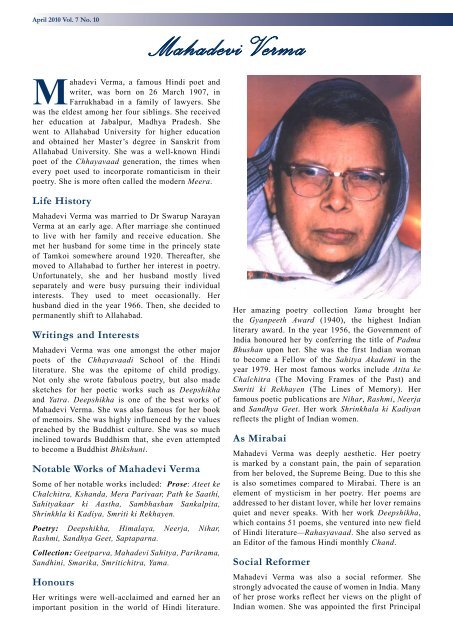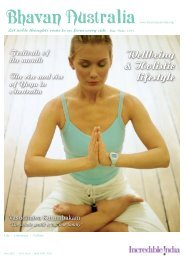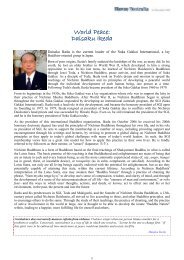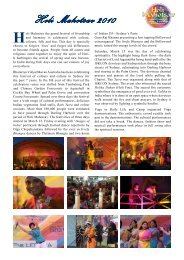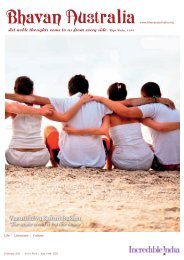'The whole world is but one family' - Bharatiya Vidya Bhavan Australia
'The whole world is but one family' - Bharatiya Vidya Bhavan Australia
'The whole world is but one family' - Bharatiya Vidya Bhavan Australia
You also want an ePaper? Increase the reach of your titles
YUMPU automatically turns print PDFs into web optimized ePapers that Google loves.
April 2010 Vol. 7 No. 10<br />
Mahadevi Verma, a famous Hindi poet and<br />
writer, was born on 26 March 1907, in<br />
Farrukhabad in a family of lawyers. She<br />
was the eldest among her four siblings. She received<br />
her education at Jabalpur, Madhya Pradesh. She<br />
went to Allahabad University for higher education<br />
and obtained her Master’s degree in Sanskrit from<br />
Allahabad University. She was a well-known Hindi<br />
poet of the Chhayavaad generation, the times when<br />
every poet used to incorporate romantic<strong>is</strong>m in their<br />
poetry. She <strong>is</strong> more often called the modern Meera.<br />
Life H<strong>is</strong>tory<br />
Mahadevi Verma was married to Dr Swarup Narayan<br />
Verma at an early age. After marriage she continued<br />
to live with her family and receive education. She<br />
met her husband for some time in the princely state<br />
of Tamkoi somewhere around 1920. Thereafter, she<br />
moved to Allahabad to further her interest in poetry.<br />
Unfortunately, she and her husband mostly lived<br />
separately and were busy pursuing their individual<br />
interests. They used to meet occasionally. Her<br />
husband died in the year 1966. Then, she decided to<br />
permanently shift to Allahabad.<br />
Writings and Interests<br />
Mahadevi Verma was <strong>one</strong> amongst the other major<br />
poets of the Chhayavaadi School of the Hindi<br />
literature. She was the epitome of child prodigy.<br />
Not only she wrote fabulous poetry, <strong>but</strong> also made<br />
sketches for her poetic works such as Deepshikha<br />
and Yatra. Deepshikha <strong>is</strong> <strong>one</strong> of the best works of<br />
Mahadevi Verma. She was also famous for her book<br />
of memoirs. She was highly influenced by the values<br />
preached by the Buddh<strong>is</strong>t culture. She was so much<br />
inclined towards Buddh<strong>is</strong>m that, she even attempted<br />
to become a Buddh<strong>is</strong>t Bhikshuni.<br />
Notable Works of Mahadevi Verma<br />
Some of her notable works included: Prose: Ateet ke<br />
Chalchitra, Kshanda, Mera Parivaar, Path ke Saathi,<br />
Sahityakaar ki Aastha, Sambhashan Sankalpita,<br />
Shrinkhla ki Kadiya, Smriti ki Rekhayen.<br />
Poetry: Deepshikha, Himalaya, Neerja, Nihar,<br />
Rashmi, Sandhya Geet, Saptaparna.<br />
Collection: Geetparva, Mahadevi Sahitya, Parikrama,<br />
Sandhini, Smarika, Smritichitra, Yama.<br />
Honours<br />
Her writings were well-acclaimed and earned her an<br />
important position in the <strong>world</strong> of Hindi literature.<br />
Mahadevi Verma<br />
Her amazing poetry collection Yama brought her<br />
the Gyanpeeth Award (1940), the highest Indian<br />
literary award. In the year 1956, the Government of<br />
India honoured her by conferring the title of Padma<br />
Bhushan upon her. She was the first Indian woman<br />
to become a Fellow of the Sahitya Akademi in the<br />
year 1979. Her most famous works include Atita ke<br />
Chalchitra (The Moving Frames of the Past) and<br />
Smriti ki Rekhayen (The Lines of Memory). Her<br />
famous poetic publications are Nihar, Rashmi, Neerja<br />
and Sandhya Geet. Her work Shrinkhala ki Kadiyan<br />
reflects the plight of Indian women.<br />
As Mirabai<br />
Mahadevi Verma was deeply aesthetic. Her poetry<br />
<strong>is</strong> marked by a constant pain, the pain of separation<br />
from her beloved, the Supreme Being. Due to th<strong>is</strong> she<br />
<strong>is</strong> also sometimes compared to Mirabai. There <strong>is</strong> an<br />
element of mystic<strong>is</strong>m in her poetry. Her poems are<br />
addressed to her d<strong>is</strong>tant lover, while her lover remains<br />
quiet and never speaks. With her work Deepshikha,<br />
which contains 51 poems, she ventured into new field<br />
of Hindi literature—Rahasyavaad. She also served as<br />
an Editor of the famous Hindi monthly Chand.<br />
Social Reformer<br />
Mahadevi Verma was also a social reformer. She<br />
strongly advocated the cause of women in India. Many<br />
of her prose works reflect her views on the plight of<br />
Indian women. She was appointed the first Principal


